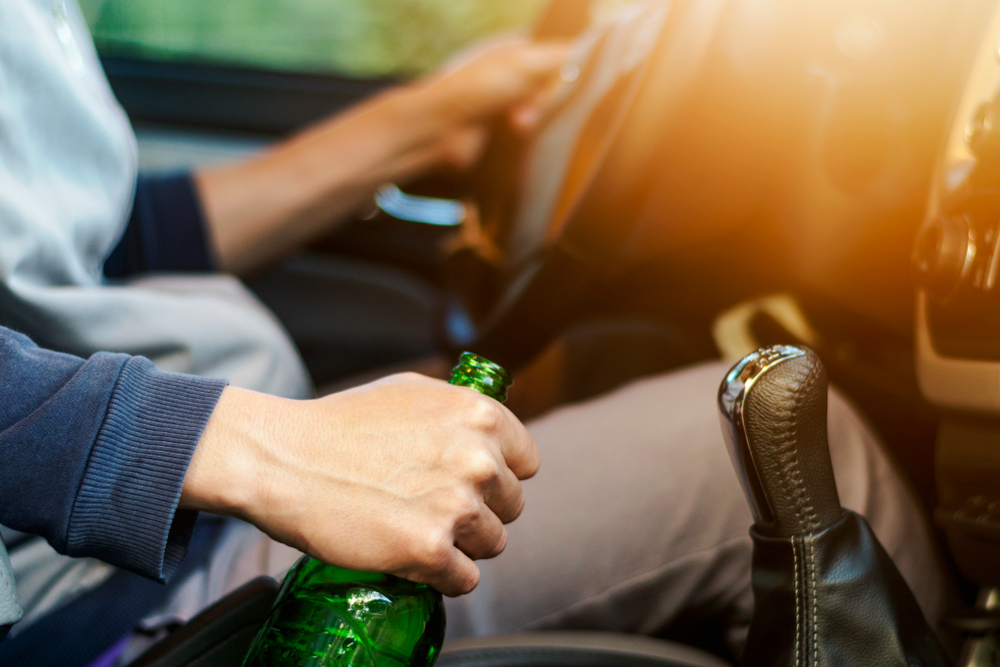Seeing the blinking red and blue lights of a police car in your rear-view mirror will always unnerve you, especially if you recently had something alcoholic to drink. Even if you are completely sober, police officers might suspect you were drinking and question you about the matter.
If a police officer pulls you over, they may ask you for certain information, but they cannot violate your legal or constitutional rights. If they do, and you end up in jail, the right DUI defense lawyer in Cleveland can use any violations as part of your defense against criminal charges.
If a police officer recently pulled you over or arrested you during a traffic stop involving driving under the influence or DUI, speak with an experienced criminal defense attorney right away. Your attorney can explore your legal options and represent you in all criminal proceedings, including a criminal court trial. Your lawyer can raise any possible legal defenses to your pending DUI charge or negotiate a favorable plea deal with the state prosecutor handling your case.
Always hire a defense lawyer who will identify whether officers violated your rights and use any constitutional violations to your advantage. Act now to seek defense representation for your DUI charges.
What is OVI in Ohio?
Under the Ohio Criminal Code, operating a motor vehicle while under the influence of alcohol or drugs – or OVI – is a severe offense. A driver may incur an OVI conviction if they operate a passenger vehicle with a blood alcohol concentration (BAC) of at least 0.08 percent. They might also receive a harsher conviction if they have a BAC of 0.17 or greater.
Finally, an individual can receive an OVI if they have a certain amount of methamphetamines, amphetamines, cocaine, heroin, LSD, marijuana, or some combination in their system.
A police officer can place you under arrest if a breathalyzer test determines that your BAC is higher than the prescribed legal limit. An officer might also arrest you if you refuse to submit to a chemical test.
If a police officer recently arrested you for a drunk driving offense, you must have legal representation in your corner immediately. Your attorney can meet with you to discuss your circumstances and determine your legal rights and options.
What are the Potential Penalties for an OVI Conviction in Ohio?
An OVI conviction in Ohio can lead to severe criminal penalties. For a judge to impose criminal penalties against you, the state prosecutor must first satisfy their legal burden of proof in the case beyond a reasonable doubt. If the prosecutor cannot meet this legal burden, then the court may completely dismiss your OVI case.
However, if the prosecutor satisfies their burden of proof, your case will proceed to a sentencing hearing where a judge can impose penalties.
- A conviction on a first offense can result in a maximum of six months of incarceration, a maximum of five years of probation, and a maximum monetary fine of $1,075.
- A second offense can lead to a minimum of 10 days in jail and a maximum monetary fine of $1,625.
- A third offense can result in 30 days to one year of incarceration, a maximum of five years of probation and a maximum monetary fine of $2,750.
- A fourth offense is a felony charge, and a conviction can result in one year of incarceration and a maximum monetary fine of $10,500.
If the driver’s BAC exceeds 0.17, they are a high-level offender. In those circumstances, a judge can impose double jail time.
Besides high monetary fines and the threat of incarceration, a convicted OVI offender might have to complete a probation period, attend alcohol and drug rehabilitation classes, or install an ignition interlock device, or IID, on their vehicle. In addition to paying the initial installation costs for an IID, an individual may also have to pay ongoing maintenance fees.
The driver will have to blow into the device for their vehicle to start. If the device detects any alcohol on their breath, the car will not start.
In addition to incurring these legal penalties upon conviction, an OVI offender may experience numerous collateral consequences that can affect various aspects of their life. For example, the individual may have difficulty finding or keeping a job, attending a college or university, keeping scholarship funds (if they are a current student), or finding a place to live. Additionally, convicted OVI offenders may suffer significant harm to their personal or professional reputation in the local community.
If you ultimately incur a conviction for OVI in Ohio, you need an experienced criminal defense attorney advocating for you at every stage of your case. Your lawyer can represent you at your sentencing hearing and work to lessen the potential penalties and collateral consequences that you may face due to your OVI conviction.
Legal Rights in an Ohio OVI Case
For a police officer to lawfully pull your vehicle over, they must have reasonable suspicion or probable cause that you are violating a law. Consequently, a police officer does not have the authority to pull your vehicle over randomly. However, they can pull your car over if you broke the speed limit, fail to use a turn signal at the proper time, or commit some other minor traffic violation.

However, at an OVI checkpoint in Ohio, a police officer following the proper procedures may pull certain vehicles over, such as every third or fifth vehicle, and ask the driver to submit to a sobriety test. Regardless of whether a police officer pulls you over at an OVI checkpoint or while operating your vehicle at some other location, you have certain legal and constitutional rights.
First, besides providing your name, you have a right to remain silent. If the police officer asks you whether you had anything to drink previously in the evening, you do not have to answer the question. Similarly, you do not have to answer a question about where you are coming from. However, you do have to give your name and provide other standard information, such as proof of insurance and your driver’s license.
Additionally, if a police officer pulls you over, you may refuse the officer’s request to search your vehicle. This is true unless the officer has probable cause or a search warrant. If the officer does not have one of those two, they may not search your vehicle without your express consent.
In addition, you have a legal right to refuse to take a requested field sobriety test. Many of these tests are difficult for individuals to pass even if they are not under the influence of alcohol or drugs. Therefore, the officer may use these subjective tests to determine if you are intoxicated, and they may use your performance to place you under arrest, take you to the police station, and administer chemical testing.
What Are Implied Consent Laws in Ohio?
If a police officer pulls your vehicle over, under implied consent laws in Ohio, you may refuse to take a requested chemical sobriety test, whether a urine, breath, or blood test.
If you refuse, the Motor Vehicle Administration (MVA) may suspend your driver’s license for a maximum of one year. However, an experienced criminal defense attorney can seek driving privileges for specific limited purposes. In addition, if you refuse a chemical test, you may have a more robust legal defense if your case goes to trial since the state cannot point to a specific BAC level of intoxication.
In addition, if you take the requested chemical test and your BAC exceeds the legal limit, the chances you will probably incur an OVI conviction. In addition, the MVA will suspend your driving privileges for a minimum of 90 days – and a minimum of one year if you ultimately sustain an OVI conviction.
Legal Defenses to an OVI Charge in Ohio
In response to a criminal OVI charge in Ohio, you can raise several legal defenses. Although you do not have to satisfy any legal burden of proof in your criminal case, a strong defense can work to negate one or more legal elements of the prosecution’s case. Moreover, if a particular defense succeeds, the state prosecutor may not satisfy their legal burden of proof, resulting in a case dismissal.
First, you can allege that the police officer initiated an invalid traffic stop violating your Fourth Amendment constitutional right against unreasonable searches and seizures. Additionally, you can argue that the police officer violated your Fifth Amendment rights if they continued questioning you after you invoked your right to the presence of legal counsel during questioning.
Additionally, you can contend that the police officer failed to follow the proper procedures when they administered a field sobriety test in your case. If you suffered from a balance issue or medical issue that prevented you from performing the test correctly, or if the officer failed to account for lighting or environmental conditions, you can raise those defenses.
Finally, you can argue that the office administering a test did not calibrate the breathalyzer machine or that a toxicologist made a mistake when evaluating chemical test results.
Your criminal defense attorney can determine if you can raise one or more of these legal defenses at your criminal court trial. Additionally, they can answer all of your legal questions and work to protect all of your legal and constitutional rights while your criminal OVI case is pending in the court system.
Plea Deals in OVI Cases
In some instances, the state prosecutor handling your case might be willing to offer you a favorable plea deal. In a plea deal arrangement, the prosecutor may reduce your DUI charge to a reckless driving charge, or they may offer you probation in exchange for a guilty plea.
If you subsequently complete all of the required terms of your probation, any conviction on your record may disappear.
Before you agree to accept a plea deal from the state’s attorney, you should speak with a knowledgeable criminal defense attorney in your area. Your lawyer can advise whether to accept a plea deal, given the facts and circumstances of your case, or whether you should consider taking your case to a criminal bench or jury trial.
If you decide to accept a plea deal, you should be aware that you are giving up certain legal rights, including your constitutional right to a jury trial and your right of appeal.

Talk to an OVI Defense Attorney in Your Area Right Away
A DUI arrest is a big deal. A conviction can have long-lasting negative effects on you. It can cause you to lose your job or even your ability to legally operate a motor vehicle. It can be daunting to contemplate, but there is support available.
Following an OVI arrest, you need a skilled criminal defense attorney in your corner advocating for your legal rights and interests. Your lawyer can formulate a solid legal defense to your OVI charge or pursue a favorable plea deal from the prosecuting attorney in your case.

